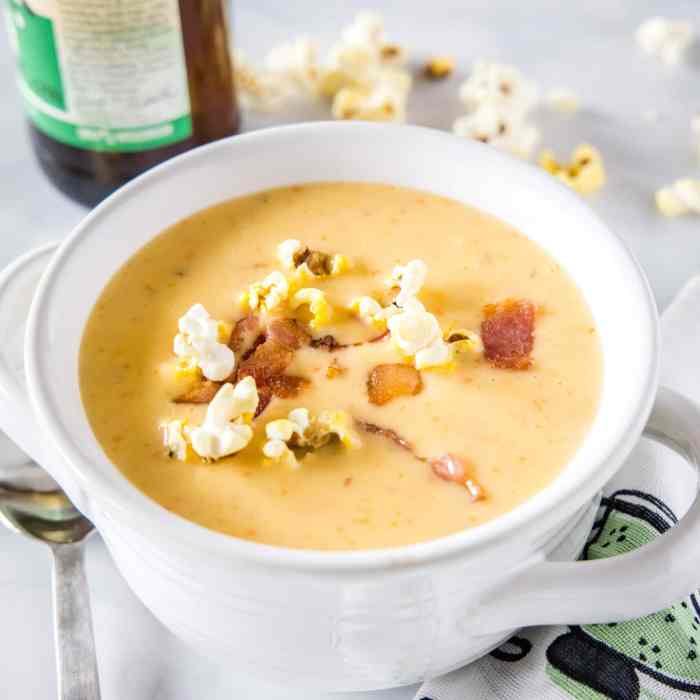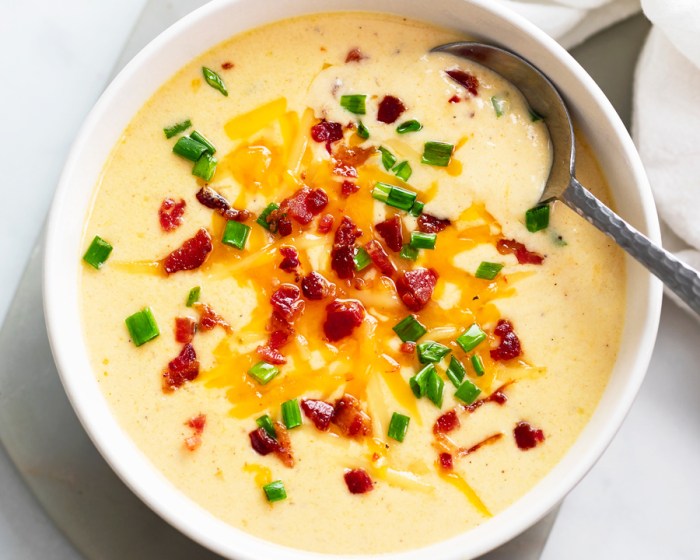Caloric Content and Serving Size

Beer cheese soup nutrition – Understanding the calorie count of beer cheese soup is crucial for mindful eating. The caloric density varies significantly depending on the recipe and the serving size, making it essential to be aware of these factors to make informed choices. This section will explore the key ingredients influencing calorie content and provide examples of calorie counts for different variations.
The calorie count of beer cheese soup is primarily determined by the types and quantities of cheese, cream, and any additional ingredients such as bacon or sausage. Using heavier cheeses like cheddar or Gruyere will result in a higher calorie count compared to lighter cheeses such as Monterey Jack. Similarly, the amount of cream directly impacts the overall calorie density.
Beer cheese soup, while flavorful, often contains high levels of sodium and saturated fat. A comparative nutritional analysis reveals that the caloric density can vary significantly depending on the recipe. For instance, understanding the nutritional profile of similar processed cheese-based meals, such as the kraft mac and cheese cup nutrition , provides context for evaluating the overall health implications.
Ultimately, mindful portion control is crucial when consuming both beer cheese soup and other rich, cheesy dishes.
Adding ingredients like bacon or sausage significantly increases the calorie content due to their high fat content. Serving size also plays a crucial role; a larger serving naturally contains more calories.
Calorie Variation in Beer Cheese Soup Recipes
The following table illustrates the approximate calorie count per serving for different variations of beer cheese soup, assuming a standard serving size of approximately 1.5 cups (355 ml). These are estimates and can vary based on specific ingredients and preparation methods.
| Recipe Variation | Cheese Type(s) | Cream/Milk | Additional Ingredients | Approximate Calories per Serving (1.5 cups) |
|---|---|---|---|---|
| Light Beer Cheese Soup | Monterey Jack, Colby | Reduced-fat milk | None | 250-300 |
| Classic Beer Cheese Soup | Cheddar, Gruyere | Heavy cream | None | 350-400 |
| Loaded Beer Cheese Soup | Cheddar, Gruyere | Heavy cream | Bacon, sausage | 450-550 |
| Vegetarian Beer Cheese Soup | Sharp cheddar, Fontina | Half-and-half | Carrots, potatoes | 300-350 |
Impact of Ingredients on Nutritional Value: Beer Cheese Soup Nutrition

Beer cheese soup, a comforting and flavorful dish, derives its nutritional profile from a blend of ingredients, each contributing unique benefits and drawbacks. Understanding the nutritional impact of these components is key to appreciating the overall nutritional value—or lack thereof—of this popular soup. This section will delve into the nutritional contributions of the primary ingredients, highlighting both their positive and negative aspects.
Nutritional Contributions of Major Ingredients, Beer cheese soup nutrition
The nutritional value of beer cheese soup is significantly shaped by its core components: beer, cheese, milk or cream, and vegetables (if included). Beer, while providing some B vitamins, is primarily a source of carbohydrates and calories. The type of beer used influences the nutritional profile; darker beers tend to be richer in calories and antioxidants. Cheese, a major contributor to the soup’s richness and flavor, is a substantial source of protein and fat, along with calcium and various vitamins.
The type of cheese significantly impacts the nutritional content; harder cheeses generally contain more protein and less moisture than softer varieties. Milk or cream, often used as a base, adds further calories and fat, but also contributes to the soup’s creamy texture and calcium content. Finally, the inclusion of vegetables, such as carrots, potatoes, or onions, boosts the soup’s vitamin and mineral content, adding fiber and reducing the overall fat content.
Health Benefits and Drawbacks of Common Ingredients
The health impact of beer cheese soup is a complex interplay of its ingredients. The beer, while offering some B vitamins, contributes to the overall caloric content and can contain alcohol, which has potential health consequences if consumed in excess. Cheese, rich in protein and calcium, offers bone-health benefits, but its high fat content can contribute to high cholesterol if consumed regularly in large quantities.
Milk or cream, while providing calcium, also adds significant fat and calories, potentially impacting weight management. The addition of vegetables mitigates some of these drawbacks, providing essential vitamins, minerals, and fiber, promoting digestive health. However, the overall effect depends heavily on the specific ingredients and their quantities.
Nutritional Profiles of Different Cheese Types
The choice of cheese dramatically alters the soup’s nutritional profile. Cheddar cheese, a common choice, provides a good source of protein and calcium, but is also relatively high in fat. Sharp cheddar, a more mature variety, often has a slightly higher fat content compared to standard cheddar. Gruyère, a Swiss cheese, tends to be lower in fat than cheddar but still provides protein and calcium.
For example, a cup of beer cheese soup made with cheddar cheese might contain significantly more saturated fat than a similar soup made with Gruyère. This difference in fat content directly impacts the soup’s overall caloric value and potential impact on cholesterol levels. Choosing lower-fat cheese options, or incorporating vegetables to increase volume and reduce the proportion of cheese, can help create a healthier version of the soup.
Answers to Common Questions
Is beer cheese soup high in sodium?
Yes, it can be, depending on the cheese and broth used. Look for low-sodium options and consider reducing the salt during preparation.
Can I make beer cheese soup vegetarian?
Absolutely! Omit any meat additions like bacon or sausage. Ensure your broth is vegetarian-friendly.
Is beer cheese soup gluten-free?
Usually, but check the beer label to ensure it’s gluten-free. Some beers contain gluten.
What type of beer is best for beer cheese soup?
A darker beer, like a stout or porter, adds more depth of flavor. Lighter beers work too, but might result in a milder taste.






